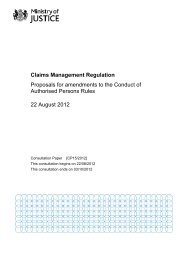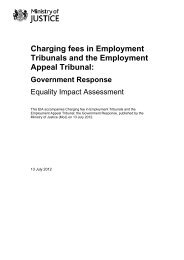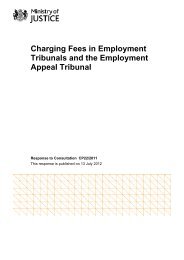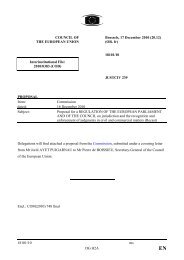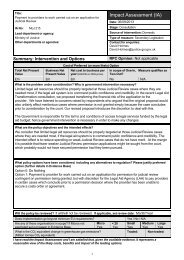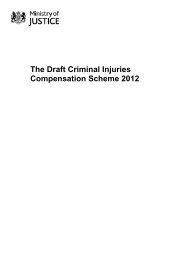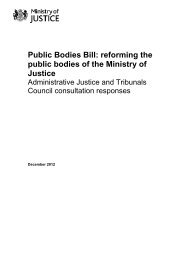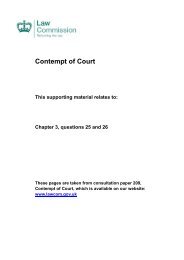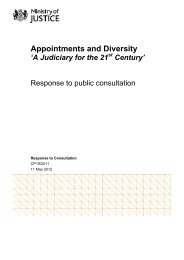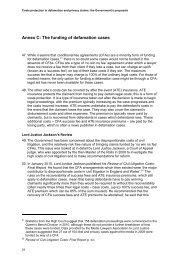Proposed reforms to attachment of earnings orders - Ministry of Justice
Proposed reforms to attachment of earnings orders - Ministry of Justice
Proposed reforms to attachment of earnings orders - Ministry of Justice
Create successful ePaper yourself
Turn your PDF publications into a flip-book with our unique Google optimized e-Paper software.
Evidence Base (for summary sheets)<br />
1. Introduction<br />
Background<br />
1.1 The Government believes that responsible credi<strong>to</strong>rs who are owed money and have gained<br />
judgment in a court should have the right <strong>to</strong> enforce that judgment. Equally, deb<strong>to</strong>rs should be<br />
protected from the oppressive pursuit <strong>of</strong> their debts.<br />
1.2 Effective enforcement is crucial <strong>to</strong> both the criminal and civil justice systems. People ordered <strong>to</strong><br />
pay a court judgment, criminal penalties and compensation awards, or <strong>to</strong> comply with the terms<br />
<strong>of</strong> a community sentence, have little or no incentive <strong>to</strong> do so if they know there is no effective<br />
means <strong>of</strong> enforcing it. Unless there is prompt and efficient enforcement, the authority <strong>of</strong> the<br />
courts, the deterrent value <strong>of</strong> penalties and public confidence in the justice systems might all be<br />
undermined.<br />
1.3 Under the existing arrangements, following a judgment after a payment has not been received a<br />
credi<strong>to</strong>r may apply <strong>to</strong> the court <strong>to</strong> enforce the judgment. The credi<strong>to</strong>r will decide which <strong>of</strong> the<br />
following court based enforcement methods they favour such as: <strong>attachment</strong> <strong>of</strong> <strong>earnings</strong> order<br />
(AEO), charging <strong>orders</strong>, third party debt <strong>orders</strong>, judgment summonses, or warrants <strong>of</strong> execution.<br />
1.4 This impact assessment focuses on <strong>attachment</strong> <strong>of</strong> <strong>earnings</strong> <strong>orders</strong> only. The <strong>reforms</strong> apply <strong>to</strong> all<br />
forms <strong>of</strong> civil case but not <strong>to</strong> family or criminal cases. They relate <strong>to</strong> all civil cases where an<br />
<strong>attachment</strong> <strong>of</strong> <strong>earnings</strong> order has been obtained in order <strong>to</strong> secure money from the deb<strong>to</strong>r. This<br />
might be all forms <strong>of</strong> civil case where payments are owed, not just cases involving money<br />
lending.<br />
1.5 In 2009 there were approximately 61,000 <strong>attachment</strong> <strong>of</strong> <strong>earnings</strong> <strong>orders</strong> issued in the County<br />
Court. Our proposed changes (already legislated for in the TCE Act ’07) aim <strong>to</strong> improve the<br />
effectiveness <strong>of</strong> these as an enforcement method, whilst still <strong>of</strong>fering protection <strong>to</strong> deb<strong>to</strong>rs who<br />
are genuinely unable <strong>to</strong> pay.<br />
Policy Objectives<br />
1.6 Efficiency and fairness concerns are driving our proposed <strong>reforms</strong>. If the Government does<br />
nothing then the current process for <strong>attachment</strong> <strong>of</strong> <strong>earnings</strong> would continue <strong>to</strong> apply. However<br />
this would not address the present failings - repayment through <strong>attachment</strong> <strong>of</strong> <strong>earnings</strong> would<br />
continue <strong>to</strong> be potentially sporadic and easy <strong>to</strong> evade, and confidence in the justice system might<br />
not improve. We cannot say whether or not the problem would worsen, since this would require<br />
predicting future behavioural changes between the disparate groups involved in court processes.<br />
We have assumed, however, that the problems are unlikely <strong>to</strong> rectify themselves, since this<br />
would probably already have happened over the course <strong>of</strong> time.<br />
Policy Proposals<br />
1.7 We propose implementing the Part 4 <strong>of</strong> the TCE Act ’07 in relation <strong>to</strong> <strong>attachment</strong> <strong>of</strong> <strong>earnings</strong>.<br />
1.8 This would include:<br />
1) Introducing fixed tables for the calculation for <strong>earnings</strong> deductions, in place <strong>of</strong> current case by<br />
case calculations.<br />
2) Introducing the ability for courts, where an AEO has failed (where the deb<strong>to</strong>r has changed<br />
employment but has failed <strong>to</strong> notify the court), <strong>to</strong> request HM Revenue & Cus<strong>to</strong>ms (HMRC) <strong>to</strong><br />
provide the name and address <strong>of</strong> the deb<strong>to</strong>r’s current employer for the purposes <strong>of</strong> redirecting<br />
the AEO<br />
1.9 By implementing these policies, already legislated for in the TCE Act ‘07, the Government<br />
believes that it can provide a simpler, consistent and more effective process <strong>of</strong> enforcement by:<br />
6



